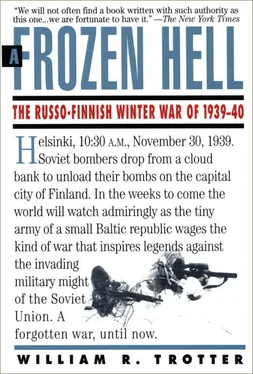William Trotter - A Frozen Hell
Здесь есть возможность читать онлайн «William Trotter - A Frozen Hell» весь текст электронной книги совершенно бесплатно (целиком полную версию без сокращений). В некоторых случаях можно слушать аудио, скачать через торрент в формате fb2 и присутствует краткое содержание. Город: Chapel Hill, Год выпуска: 2000, ISBN: 2000, Издательство: Algonquin Books of Chapel Hill, Жанр: military_history, История, на английском языке. Описание произведения, (предисловие) а так же отзывы посетителей доступны на портале библиотеки ЛибКат.
- Название:A Frozen Hell
- Автор:
- Издательство:Algonquin Books of Chapel Hill
- Жанр:
- Год:2000
- Город:Chapel Hill
- ISBN:978-1565122499
- Рейтинг книги:3 / 5. Голосов: 1
-
Избранное:Добавить в избранное
- Отзывы:
-
Ваша оценка:
- 60
- 1
- 2
- 3
- 4
- 5
A Frozen Hell: краткое содержание, описание и аннотация
Предлагаем к чтению аннотацию, описание, краткое содержание или предисловие (зависит от того, что написал сам автор книги «A Frozen Hell»). Если вы не нашли необходимую информацию о книге — напишите в комментариях, мы постараемся отыскать её.
A Frozen Hell — читать онлайн бесплатно полную книгу (весь текст) целиком
Ниже представлен текст книги, разбитый по страницам. Система сохранения места последней прочитанной страницы, позволяет с удобством читать онлайн бесплатно книгу «A Frozen Hell», без необходимости каждый раз заново искать на чём Вы остановились. Поставьте закладку, и сможете в любой момент перейти на страницу, на которой закончили чтение.
Интервал:
Закладка:
The war’s first shots were fired on November 26. They numbered seven, and the fall of shot was pinpointed by three Finnish observation posts. These witnesses estimated that the shells detonated approximately 800 meters inside Soviet territory. That afternoon, Molotov sent Helsinki a furious note, accusing the Finns of firing an artillery barrage and claiming that the shells had killed four Russian soldiers and wounded nine others.
These were the famous “Mainila shots,” named after the village nearest the explosions. The Finns did not, indeed could not, have fired them. Mannerheim had long since ordered all Finnish guns drawn back out of range, in order to prevent just such an incident from happening. The wording of Molotov’s note indicates that he may not have known the shots were going to be fired; for an ultimatum, it contains some oddly conciliatory phrases.
For many years there was speculation that even Stalin may not have ordered the shots to be fired, and that Zhdanov did it on his own to precipitate a crisis and prove his zeal to his master. Again Khrushchev throws some light on the matter.
The Mainila shots, he claimed, were set up by Marshal of Artillery Kulik, a brutal and cretinous NKVD general whose military incompetence would cost the Soviet Union terribly during the first weeks of the German invasion. It is logical to assume that Zhdanov and Stalin both knew of the fabrication and condoned it. Khrushchev deals coyly with the question of who fired first at whom: “It’s always like that when people start a war. They say, ‘You fired the first shot,’ or ‘You slapped me first and I’m only hitting back.’ There was once a ritual which you sometimes see in opera: someone throws down a glove to challenge someone else to a duel; if the glove is picked up, that means the challenge is accepted. Perhaps that’s how it was done in the old days, but in our time it’s not always so clear who starts a war.” [6] Ibid.
Helsinki replied to Molotov’s note with protestations of innocence, citing Mannerheim’s pullback order as proof. There was no response from Moscow. For several hours the northland held its breath. Then came the following note from the Kremlin:
As is well known, attacks by units of the Finnish armed forces against Soviet forces continue not only on the Karelian Isthmus, but also at other points along the Soviet-Finnish frontier. The Soviet Union can no longer tolerate this situation. By reason of the situation which has arisen, for which the Finnish government alone bears responsibility, the Soviet government can no longer maintain normal relations with Finland, and is obliged to recall from Finland its political and economic representatives.
A few hours later Helsinki was on fire from Soviet bombs.
CHAPTER 2
The Baron
His statue looms above the avenue that bears his name, across from the Central Post Office in Helsinki, his stone gaze sweeping forever across a capital city that he conquered, ruled, yet was never really part of. That is how most people visualize him, by means of that outsized equestrian monument, and as strong-man-on-horseback statues go, it is not a bad specimen. The figure has dignity, the face wears an expression of gravity rather than bombast, and there is no phony saber for the pigeons to mock.
Carl Gustav Mannerheim towers above all other characters in the annals of the Winter War. Arguably the greatest Baltic statesman since Gustavus Adolphus, he was an elusive, complex, enigmatic, and powerful man who urgently deserves a good English-language biography. He is unlikely to get it, if only because of the linguistic difficulties of the kind of research that would be required to do justice to the subject.
Mannerheim was born in 1867, near the town of Aabo, into a prominent family of Swedish-Finnish aristocrats. His career path was a common one in those days: he chose the military, and became a member of the Finnish Corps of Cadets shortly after his fourteenth birthday. His entire subsequent career, however, can be traced directly from an incident that happened in 1886, when Mannerheim was nineteen. He went AWOL, got caught, and was expelled from the corps.
Boys will be boys, especially if their families are as well connected as the Baron’s. He simply crossed the border and obtained an appointment to the tsar’s Nikolaevski Cavalry School. Apparently he had already sown whatever small amount of wild oats were in his system, for his record at the cavalry school was superior, and he graduated with a lieutenant’s commission in 1889.
Two years later he won a coveted posting to the elite Chevalier Guards. Among his responsibilities was the job of overseeing the dress and bearing of the interior sentries at the Winter Palace in St. Petersburg. His view of the tsarist regime was therefore obtained from a splendid elevation, permitting him almost daily contact with the royal family.
During the last Romanov coronation, in 1896, Mannerheim enjoyed a place of honor at the heart of those lavish, Mussorgskian rites: he stood at the bottom of the steps leading to the throne itself. The four-and-a-half-hour ceremony, during every minute of which he was compelled to stand motionless in full dress uniform, emblazoned itself on his mind; even half a century later he spoke of it with deep emotion, recalling the ceremony as “indescribably magnificent.” [1] Mannerheim, Gustav, Memoirs of Marshal Mannerheim (New York: E. P. Dutton, 1945), 47.
To him, the essence of the tsarist heritage was its outward grandeur; it seemed to make little if any difference to him that its embodiment was a third-rate incompetent.
When war broke out between Russia and Japan, Mannerheim chose the sterner path of professionalism. He campaigned strenuously and earned a reputation for personal bravery the hard way: his horse was shot dead from under him during a reconnaissance patrol. He was promoted to colonel as a reward for his services in this ill-starred conflict and received a mention-in-dispatches from the tsar himself.
Two years later the tsar offered Mannerheim a choice assignment: a two-year trek through Central Asia, on horseback, from Turkestan to Peking, a distance of at least 5,000 miles. Ostensibly his mission was ceremonial and scholarly, but its real object was to collect information, both topographical and political, that might be of strategic interest at some future date. Specifically, he was ordered to collect information about the attitude of local rulers toward the tsar, and to find out all he could about regional rivalries that might be usefully exploited by Russian agents.
Mannerheim traveled with a small staff and an escort of handpicked cossacks; the expedition was gone for two full years and ended up traveling nearly 9,000 miles. One reason for the extra distance was a side trip to the holy city of Lhasa, a place where few foreigners had yet ventured. Much about Mannerheim’s abilities as a diplomat is revealed by the fact that he not only penetrated to the heart of Tibet but actually established a warm personal relationship with the Dalai Lama, the most sacred and least accessible ruler in Asia. In what must have been a scene straight out of a Rider Haggard novel, the reincarnation of Buddha requested, and thoroughly enjoyed receiving, lessons from the Finnish aristocrat in the art of pistol shooting. Mannerheim finished this odyssey in good health, with two massive volumes of detailed and rather pedantic observations in his saddlebags, and with a fondness for orientalia that lasted all his life.
When World War I began, Mannerheim found himself posted to the staff of the able but ill-fated General Brushilov. In 1915 he was named commander of the Twelfth Cavalry Division. In contrast to the situation in France, the eastern front had plenty of room for large, fluid engagements, and Mannerheim distinguished himself in several of them. [2] And in the process, he nearly brought about the death of the man who first encouraged the writing of this book, back in 1962. When he was a young subaltern in the tsarist army, Prince A. I. Lobanov-Rostovsky served in Brushilov’s campaign. One morning, his division was flanked and nearly trapped because the cavalry unit supposed to be screening its right wing had instead ridden off in a Custer-like plunge for glory. The commander of that cavalry division was Carl Gustav Mannerheim.
Eventually, he rose to the level of corps commander, but by that time the rot had set in throughout the tsarist army as a whole.
Интервал:
Закладка:
Похожие книги на «A Frozen Hell»
Представляем Вашему вниманию похожие книги на «A Frozen Hell» списком для выбора. Мы отобрали схожую по названию и смыслу литературу в надежде предоставить читателям больше вариантов отыскать новые, интересные, ещё непрочитанные произведения.
Обсуждение, отзывы о книге «A Frozen Hell» и просто собственные мнения читателей. Оставьте ваши комментарии, напишите, что Вы думаете о произведении, его смысле или главных героях. Укажите что конкретно понравилось, а что нет, и почему Вы так считаете.












